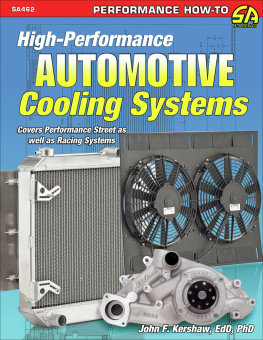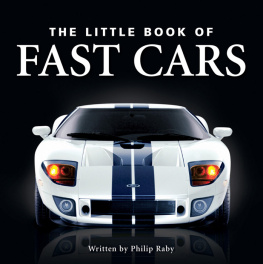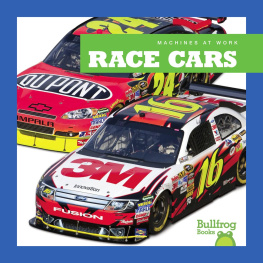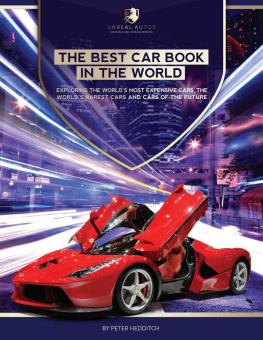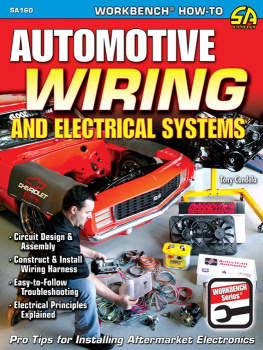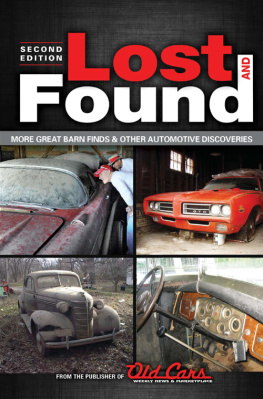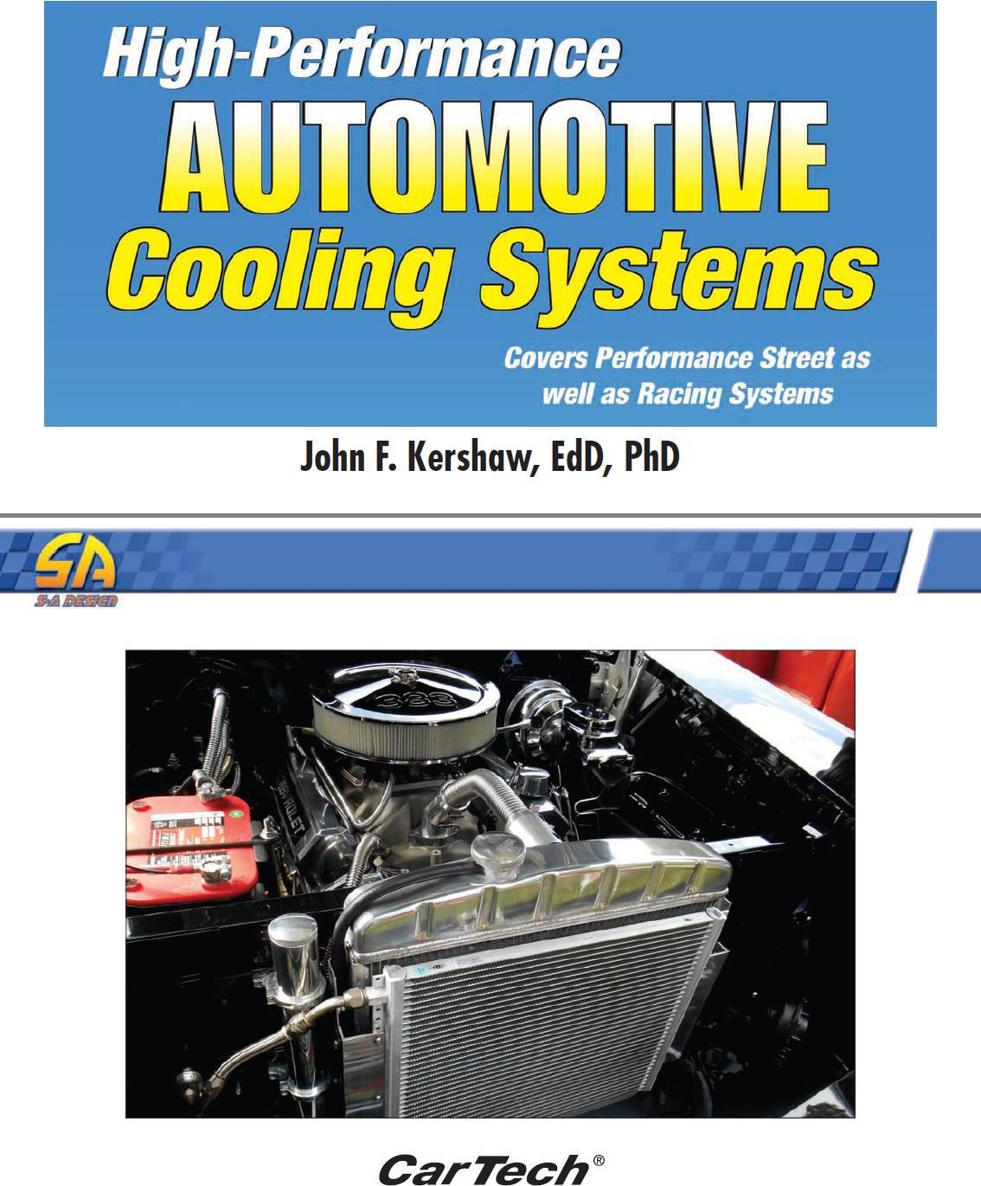
CarTech
CarTech, Inc.
838 Lake Street South
Forest Lake, MN 55025
Phone: 651-277-1200 or 800-551-4754
Fax: 651-277-1203
www.cartechbooks.com
2019 by John F. Kershaw
All rights reserved. No part of this publication may be reproduced or utilized in any form or by any means, electronic or mechanical, including photocopying, recording, or by any information storage and retrieval system, without prior permission from the Publisher. All text, photographs, and artwork are the property of the Author unless otherwise noted or credited.
The information in this work is true and complete to the best of our knowledge. However, all information is presented without any guarantee on the part of the Author or Publisher, who also disclaim any liability incurred in connection with the use of the information and any implied warranties of merchantability or fitness for a particular purpose. Readers are responsible for taking suitable and appropriate safety measures when performing any of the operations or activities described in this work.
All trademarks, trade names, model names and numbers, and other product designations referred to herein are the property of their respective owners and are used solely for identification purposes. This work is a publication of CarTech, Inc., and has not been licensed, approved, sponsored, or endorsed by any other person or entity. The Publisher is not associated with any product, service, or vendor mentioned in this book, and does not endorse the products or services of any vendor mentioned in this book.
Edit by Bob Wilson
Layout by Connie DeFlorin
ISBN 978-1-61325-504-9
Item No. SA462
Library of Congress Cataloging-in-Publication Data
Names: Kershaw, John F., author.
Title: High-performance automotive cooling systems / John F. Kershaw.
Description: Forest Lake, MN : CarTech, Inc., [2019]
Identifiers: LCCN 2018057158 | ISBN 9781613255049
Subjects: LCSH: Automobiles--Motors--Cooling systems. | Motor vehicles--Motors--Cooling systems.
Classification: LCC TL214.R3 K47 2019 | DDC 629.25/6--dc23
LC record available at https://lccn.loc.gov/2018057158
Written, edited, and designed in the U.S.A.
Printed in China
10 9 8 7 6 5 4 3 2 1
CarTech books may be purchased at a discounted rate in bulk for resale, events, corporate gifts, or educational purposes. Special editions may also be created to specification.
For details, contact Special Sales at 838 Lake Street S., Forest Lake MN 55025 or by email at .
DISTRIBUTION BY:
Europe
PGUK
63 Hatton Garden
London EC1N 8LE, England
Phone: 020 7061 1980 Fax: 020 7242 3725
www.pguk.co.uk
Australia
Renniks Publications Ltd.
3/37-39 Green Street
Banksmeadow, NSW 2109, Australia
Phone: 2 9695 7055 Fax: 2 9695 7355
www.renniks.com
Canada
Login Canada
300 Saulteaux Crescent
Winnipeg, MB, R3J 3T2 Canada
Phone: 800 665 1148 Fax: 800 665 0103
www.lb.ca
CONTENTS
ACKNOWLEDGMENTS
I want to thank my wife, Joan, for her continued support in all of my projects.
I need to acknowledge my good friend, colleague, and noted author Jim Halderman, who has generously provided photographs, information, and support for this project along with many other projects. Jim introduced me to the idea of writing a book for CarTech.
I also want to thank Michael Harding of Champion Cooling Systems, Don Meziere of Meziere Enterprises, Emillia Teta of Evans Waterless Coolant, James Chartres of Kanga Motorsports, and Mike Murray of Eastwood Radiators along with assistance from BeCool Performance and Derale Performance for their generous technical information support and use of their copyrighted photographs.
PREFACE
I wrote this book to guide readers in selecting the best engine cooling system components and their placement for modified vehicles driven on the road or the track. Engine overheating issues often arise when older modified vehicles have high-displacement engines installed for street and track use. These older vehicles had low horsepower engines that were generally smaller in size than the engines that are replacing them. Often, this has led modified vehicles to have problems with low-speed cooling due to incorrect radiator and cooling fan selection. Others overheat at 65 mph in the middle of the day due to the wrong airflow across the radiator or an inadequate water pump. The correct placement of the right components is critical to cooling system efficiency.
To run correctly, the internal combustion engine cooling system must accomplish a harmonizing act. The system needs to remove enough heat to prevent overheating and provide efficient performance while also keeping the engine operating temperature in the 180 to 210F range. To achieve and maintain optimum temperature range, an efficient engine cooling system needs the correct radiator and fan combination. It also needs the right water pump speed and coolant flow between the engine and radiator to keep the coolant in the radiator long enough to be cooled.
Typically, when an engine overheats or runs too cool, it is due to making one of several mistakes. These mistakes include using water as coolant, installing the wrong radiator, not using an anti-collapse spring in the radiator hose, installing a too-fast fan, not using a cooling fan or having too many cooling fans, installing the wrong radiator cap, using improper fan spacing and shrouding, or using inexpensive components. This book will hopefully dispel some of the common cooling systems myths and misconceptions that lead to incorrect practices and component selection by covering these mistakes.
This book will also cover thermodynamics, heat transfer, components and system operation; how to make your cooling system more efficient; and do-it-yourself service. It will provide information on how to select cooling system components for radiators, coolant, cooling fans, shrouds, thermostats, and more. Lets get started learning how to build a cooling system for your high-performance modified street or track vehicle.
CHAPTER 1
ENGINE COOLING SYSTEM BASIC OPERATION
Automotive engine cooling systems have several functions. They remove excess heat from the engine. They help a cold engine quickly reach operating temperature and then maintain constant engine operating temperature. They also provide heat for the passenger compartment for street vehicles.
Understanding the basic operation of automotive cooling systems begins with a discussion on thermodynamics. Thermodynamics primarily deals with the conversion of one form of energy to another (heat that creates motion) along with the systems used to affect these conversions. The various concepts and laws that describe the movement of heat are called the laws of thermodynamics. These laws further explain the concepts of temperature and heat transfer, which are also important for understanding how a cooling system functions.
Thermodynamics
The main thermodynamic concept is energy, which is the ability to do work. Thermodynamics also deals with heat and temperature and their relation to energy and work. For example, energy can move from one object to another due to the difference in the objects temperatures. When heat acts or moves the object through a distance, work is done.
We are discussing thermodynamics because heat is generated in an internal combustion engine, and it needs to be removed by the engine cooling system. By understanding thermodynamics, anyone can design a cooling system that removes enough heat for efficient engine operation, which results in no overheating.
Next page
